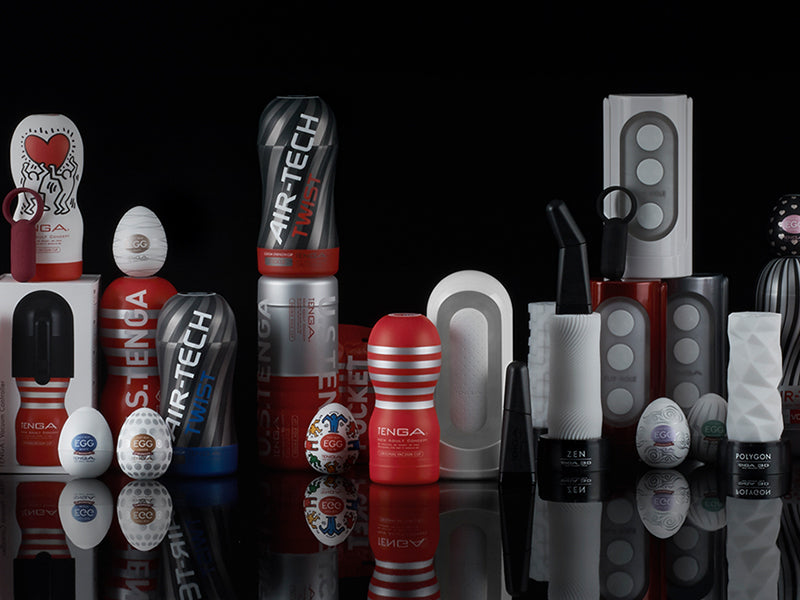Masturbation, Ejaculation, and Premature Ejaculation
Premature ejaculation can be an embarrassing occurrence, even if it only happens once or twice in your lifetime. Yet, with 30-40% of men experiencing it at least once during the course of being sexually active, it’s one of the most common sex-related problems. The real issue is when it happens with more frequency. Masturbation, when used correctly, may help aid in controlling premature ejaculation. In this article, we’ll look closer at what premature ejaculation is, the causes, treatments and exactly how masturbation can help.
Contents
What is Premature Ejaculation?

While it varies widely depending on multiple factors such as age and health, on average it takes a man between 5-7 minutes to achieve an orgasm and ejaculate during sex. With premature ejaculation, or PE, you tend to orgasm and ejaculate before having intercourse, or less than a minute after starting. As mentioned above, this happens to around 30-40% of men at least once in their lifetime, however, for some, they may find this issue persists. It is when PE becomes more frequent and/or causes problems to your personal life or self-esteem, that it might be advisable to look for treatment methods.
There are two types of premature ejaculation:
- Lifelong (Primary): Lifelong premature ejaculation occurs all or almost all the time during your sexually active life, beginning with your first experience.
- Acquired (Secondary): Acquired premature ejaculation can develop after previous sexual experiences where you may not have experienced ejaculatory issues.
Common Mistakes: PE is not necessarily ED
One common misunderstanding is the relationship between ED and PE. Erectile dysfunction (ED) and premature ejaculation are mainly linked because they are sexual dysfunctions experienced by men, but this isn’t the only connection. They are fundamentally different, although may share some common features. For example, with ED, a man may feel pressure to orgasm sooner during sex due to not wanting to lose his erection.
As we’ve mentioned, with PE, however, a man would orgasm and ejaculate before he may wish to. Both ED and PE may be caused by psychological issues such as stress or anxiety, with some studies suggesting that there may be physical connections between people who experience these conditions.
Other Sexual Dysfunctions
Aside from premature ejaculation and erectile dysfunction, men can also experience delayed or inhibited ejaculation (when there may be difficulty in achieving an orgasm and ejaculating quickly, or sometimes not at all) as well as low libido. Low libido can be both the cause or an effect of those who have either PE and ED. It may go without saying, but due to the nature of the dysfunction, delayed ejaculation, isn’t experienced by those suffering from PE.
Symptoms of Premature Ejaculation

The main symptoms that may lead to a diagnosis of suffering from premature ejaculation are as follows:
- Ejaculating within around a minute of intercourse all the time or the majority of the time.
- Difficulty in controlling when you ejaculate, either during sex or masturbation.
- The development of anxiety or avoidance of sexually intimate situations due to the above issues.
It should be noted that some men may feel that they are experiencing premature ejaculation due to orgasming earlier than they may feel to be ‘normal’. This is often due to a misunderstanding of what "average" ejaculation times are. It should be kept in mind that men naturally have different ejaculation times based on various factors. Some may also find that they sometimes ejaculate sooner than they usually would, but as long as this doesn’t fall into the above symptoms, this would not usually be considered PE.
Causes of PE
The exact cause of premature ejaculation isn’t fully understood, however, it could be linked to low levels of serotonin which is discovered in the majority of sufferers. Psychological factors such as stress, anxiety, depression, issues with your relationship, among others, can also have an effect on the causes related to PE.
How Masturbation Can Help PE

We would recommend professional assistance if you feel the causes of your PE may be due to psychological factors. If you believe it may be due to physical factors, however, masturbation is one way that many have found useful in treating issues with PE. One study found that 95% of men finding changing their masturbation habits lead to a positive effect on controlling the condition. There are a few masturbatory techniques that can be employed to help overcome and control PE:
- Squeeze Method - When you feel like you are close to orgasm, stop stroking and squeeze the head of the penis (not too forcefully) until the feeling of being close to climax passes. Repeat this method a few times before finally ejaculating.
- Stop and Start Method - Similar to the Squeeze Method, except rather than squeezing the tip of the penis you stop the stimulation for around 30 seconds. Once the feeling of being close fades, repeat again a few times before orgasming.
- Kegel Exercises - Having weak pelvic floor muscles can be a contributing factor to premature ejaculation, something practising kegel exercises can help with. You can discover the right muscles to strengthen by stopping your urine midstream. Once you have a grasp of the muscles in question, hold these muscles tight for around 3 seconds, then release them for 3 seconds. It is recommended to practice this at least 10 times, at least three times a day.
There are other methods that can be tried, such as wearing a condom during masturbation to slightly desensitise the direct stimulation or thinking of something else distracting to stop yourself from climaxing. If premature ejaculation during sex is a concern, you can try masturbating before sex, which may prolong your intercourse and help you to stay in control.
Summary
Masturbation can be an effective, first way of treating premature ejaculation yourself. This can be a way to help regain control of your ejaculatory habits while showing yourself some extra self-love. Ultimately though, if symptoms persist and are causing too much distress or having a negative effect on your life or relationship, we’d recommend seeking the advice of a doctor for medical treatments.







